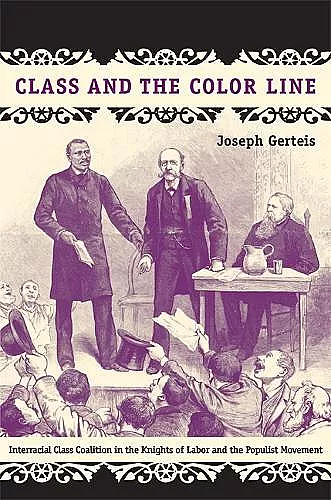Class and the Color Line
Interracial Class Coalition in the Knights of Labor and the Populist Movement
Format:Paperback
Publisher:Duke University Press
Published:24th Oct '07
Currently unavailable, and unfortunately no date known when it will be back

Class and race boundaries, and interracial political coalitions, in two significant 19th century social movements
Provides an analysis of organizing across racial lines by two labor movements in the US South during the 1880s and the 1890s.A lauded contribution to historical sociology, Class and the Color Line is an analysis of social-movement organizing across racial lines in the American South during the 1880s and the 1890s. The Knights of Labor and the Populists were the largest and most influential movements of their day, as well as the first to undertake large-scale organizing in the former Confederate states, where they attempted to recruit African Americans as fellow workers and voters.
While scholars have long debated whether the Knights and the Populists were genuine in their efforts to cross the color line, Joseph Gerteis shifts attention from that question to those of how, where, and when the movements’ organizers drew racial boundaries. Arguing that the movements were simultaneously racially inclusive and exclusive, Gerteis explores the connections between race and the movements’ economic and political interests in their cultural claims and in the dynamics of local organizing.
Interpreting data from the central journals of the Knights of Labor and the two major Populist organizations, the Farmers’ Alliance and the People’s Party, Gerteis explains how the movements made sense of the tangled connections between race, class, and republican citizenship. He considers how these collective narratives motivated action in specific contexts: in Richmond and Atlanta in the case of the Knights of Labor, and in Virginia and Georgia in that of the Populists. Gerteis demonstrates that the movements’ collective narratives galvanized interracial organizing to varying degrees in different settings. At the same time, he illuminates the ways that interracial organizing was enabled or constrained by local material, political, and social conditions.
“No issue has dogged American history more than the entangling of race and class. At the end of the nineteenth century, the complicated relations between the two shaped political struggles that have influenced American politics ever since. The fate of Populism and the Knights of Labor is thus important not just for understanding the ‘Gilded Age’ but for understanding American society in general. Joseph Gerteis brings new insights to these crucial cases, especially about how local structural conditions shaped participation in broader movements, and about the interracial organizing that took place despite animosities and manipulations. His book deserves to be widely read.”—Craig Calhoun, University Professor of the Social Sciences, New York University
“The first serious review in years of the great late-nineteenth-century social movements. Combining a theoretical overview with selected case studies, Joseph Gerteis convincingly demonstrates how the race, class, and republican identities of the actors were shaped by the shifting strategic possibilities of the moment.”—Leon Fink, editor of the journal Labor: Studies in Working-Class History of the Americas
“[A] fine study of race and class in the United States . . . [and] an impressive account of how organizational narratives shape social movement boundary work.” -- Jeffrey Haydu * Contemporary Sociology *
“This innovative and insightful study sheds new light on interracial organizing by the Knights of Labor and the Populists in the late-nineteenth-century South and provides a framework for understanding the broader interactions between race and class politics in the United States and beyond.” -- William P. Jones * Journal of American Ethnic History *
“This is a valuable book and looks upon the issue of trade union history and attempts to organise the working class to be more inclusive. . . . This is good examination of trade union history and its difficulties in drawing together different races of workers in the same class. It has good relevance and applicability for scholars in the field and as mentioned rather depressingly, these issues remain pertinent even today.” -- Jeff Fernandez * Newsletter of the British Sociological Association *
ISBN: 9780822342243
Dimensions: unknown
Weight: 413g
288 pages